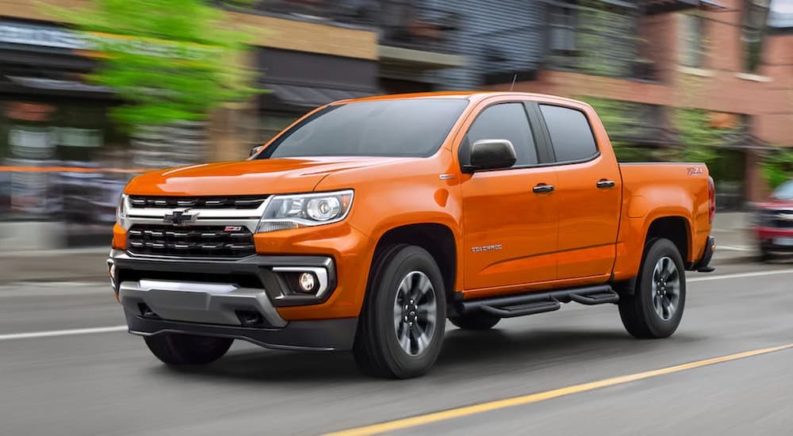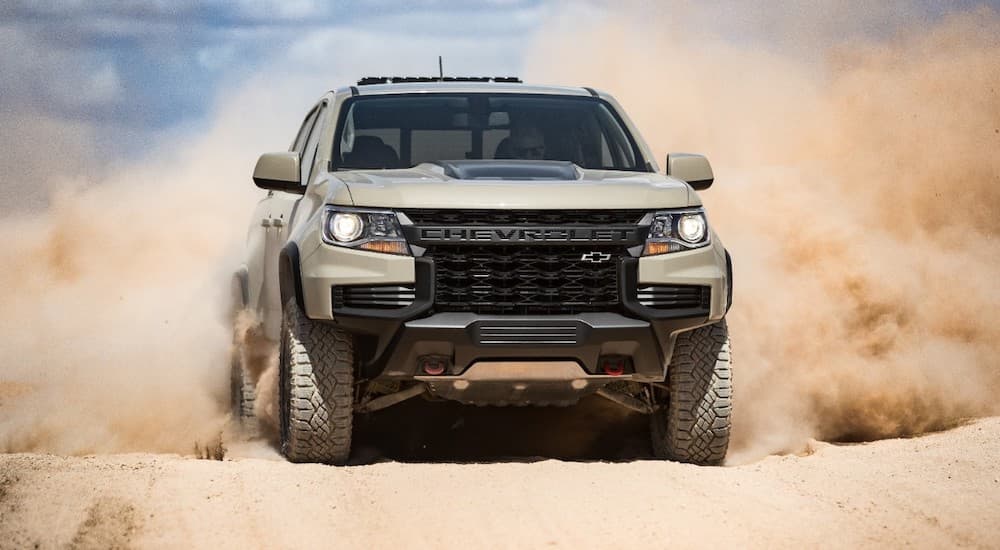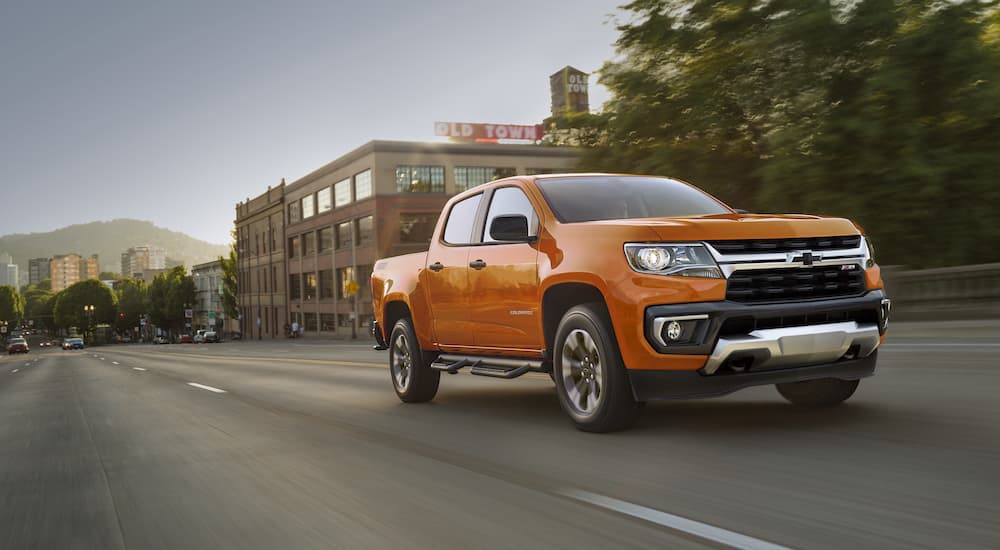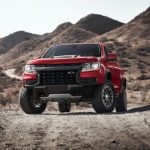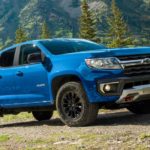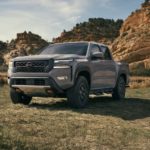“A good compromise is when both parties are dissatisfied,” – Larry David. Many of us have heard some version of that quote; it’s an astute observation and something to keep in mind anytime one finds themselves at an impasse with another. But compromise in a motor vehicle is just…disappointing. In a competitive environment, where a car that’s the best at everything is surely flawed by its price tag, designers can either compromise and disappoint themselves or find the identity of their vehicle and lean in so that it’s the best possible version of itself. The 2022 Chevy Colorado Z71 is one such vehicle – possibly the most capable midsize truck on the market, in its most capable trim, compromising on nothing.
The Farthest Thing From an Identity Crisis
The midsize pickup truck segment is crowded with a diverse array of excellent designs. Chevy isn’t the only brand to stand out by sticking to its identity, and the result is that drivers only need to know what kind of truck suits them to narrow their preference down to one or two models. While some are dedicated off-roaders, and others are more focused on comfort than performance, the Colorado’s identity is that of the classic pickup truck, modernized. It was designed to do a lot of work without demanding a lot of work to use it.
Chevy makes no bones about dressing up the interior of the Colorado, because cheap-feeling materials and large, clunky buttons and controls are also durable as heck. Above-average comfort and seamless infotainment technology are standard, ensuring the truck feels modern without compromising its toughness. Depending on the trim, Colorado offers competitive – even dominant – off-roading capability, and it brings top-tier towing, efficiency, and power ceilings, providing a variety of configurations so that the best mid-size pickup for most normal people is some form of Colorado.
The best of all of them is probably the Z71. Yes, there’s a lot of talk about the ZR2, which is arguably the best off-roader in the segment, but it gives something up over the other trim levels. A wider and taller stance pushes it towards the full-size territory while draining its fuel efficiency. The hardcore off-roading design also makes a serious knock on the truck’s towing and hauling capabilities. In short, the ZR2’s identity is fundamentally different from any other Colorado and is not nearly as good at being a Colorado as a result.
So back to the Z71 – what makes this the best trim in the Colorado lineup? For one, as the second-highest trim offered, it naturally offers superior creature comforts and technology options than other non-ZR2 trims. While its payload limit is modestly hampered by some of the upgrades, towing isn’t hindered at all, and those upgrades expand its capabilities to include moderate off-roading, too!
Giving You Plenty to Work With
Z71 is a modest off-roading package, to be sure. It’s not that it’s scant on upgrades, just that they aren’t tremendously impactful, but that’s exactly what Chevy is going for. They add a shield for Colorado’s precious AutoTrac transfer case, Hill Descent Control, an automatically locking rear differential, and the “Z71 off-road suspension package” – which Chevy’s website is mum about, and the internet is pretty sure means a slightly different set of shocks up front. If one desires to lean into the off-roading a little more, additional skid plates and a 1” front lift kit are factory options available on their own or via the new Trail Boss package and Wrangler DuraTrac all-terrain tires are uniquely available to Colorado’s Z71 and ZR2 trims.
On the other hand, if one isn’t interested in off-roading their Z71 at all, it can still be had with 2WD in Crew Cab, Short Box, V6 configuration. That’ll boost efficiency a smidge from 17- 18 MPG city and 24-25 MPG highway and still deliver on Colorado’s promise of pure-blooded modern trucking. This same configuration has Z71’s highest payload cap at 1,490 lbs. It might be an oxymoron to take a RWD configuration for an off-road-oriented trim, but Z71 is off-road capable, not off-road focused. The creature comforts made standard in Colorado’s second-highest trim count for a lot, and though heated seats, steering wheel, and mirrors, remote start, and a rear window can all be optioned onto LT trucks, the extra $1000 or so to get Z71’s Hill Descent Control and Rear Park Assist – which is not currently available on LT models – pays for itself the first time they keep a driver out of trouble.
Summed up, Z71 brings the best Colorado tech as standard features, unlocks some of the coolest Colorado packages, and maintains the Colorado’s impressive towing, hauling, and fuel-sipping standards while opening the door to comfortable off-roading. The 2022 Chevy Colorado is an every-person’s truck, with an identity centered around being easy to drive and easy to live with while still having the muscle for tough truck work, and the Z71 is currently the ultimate expression of that philosophy.
A Glance at the Comps
That being said, the Colorado Z71 doesn’t exist in a vacuum. It even competes with its stablemate, the Silverado 1500, for sales! Sure, it isn’t a real competitor in the off-roader segment – the ZR2 trim is far more well-equipped to take on the Tacoma TRD Pro and Jeep Gladiator – but there’s a whole middle-tier to consider as well. So, let’s do that for a moment and see how well this all-rounder holds up against its toughest competition.
The Silverado 1500 LT Trail Boss
The main point of contention between the Colorado and Silverado is, of course, the size. The hugely popular Silverado is more robustly equipped, with a wider array of optional advanced driver assistance tech and some of the best trailering tech in the industry. The capacities are all higher, too, but so is the price – nearly $20,000 more for a Silverado LT Trail Boss than a Colorado Z71. The problem of capacity and spaciousness works both ways, too. The Colorado is going to fit and handle comfortably in far tighter environments than the Silverado, on or off-road. None of this is news, but seeing that the full-size equivalent is 50% more expensive increases Colorado’s value proposition at the very least.
The Tacoma TRD Off-Road
Want to know how closely the mid-tier Tacoma off-roader aligns with the Z71? The MSRP difference is a mere $10 (or so, depending on the market). The comp goes to show that the Tacoma’s identity, coming from a long run as one of the only mid-size pickups in the game, is rooted in off-roading, with road trucking a secondary concern. The Tacoma brings a 3.5 L V6 engine producing 278 hp and 265 lb-ft of torque, not getting quite as much out of its power plant as the Colorado does (306 hp and 275 lb-ft from its 3.6 L V6). This contributes to a significantly reduced capability level (6,400 lb towing / 1,155 lb payload vs 7,000 and 1,490 lbs for the Colorado, respectively) without gaining any advantage in fuel economy.
It isn’t well-received as a road vehicle, and the 6-speed auto has been panned, whereas Chevy’s driving dynamics have been described as “crossover-like,” a devastating evaluation of a sports car but genuinely high praise for a truck. On the trails, Tacoma TRD Off-Road is likely the better option than Z71, featuring CRAWL mode off-road cruise control and an off-road identity built into the chassis and design – for the few to whom that matters more than daily livability; you have your winner.
The Ranger XLT Tremor
This is an interesting one. The Ranger is the Colorado’s toughest competitor, which is funny because of course the Ford is, and the trucks which look the least interesting on the outside end up being the most compelling all-arounders in the segment. Ranger offers a higher trim than XLT – the Lariat – but unlike ZR2, Lariat is a luxury-first trim and a better comp for the GMC Canyon. The Tremor off-roading package is an XLT trim exclusive, making it the version to consider here against the Z71.
The first and easiest stat comp to go for is also, in some ways, the trickiest. Ranger offers excellent payload and towing ratings, handling 7,500 lb trailers and 1,468 lb payloads, but its 2.3 L EcoBoost I-4 engine only manages 19 MPG city and highway in Tremor guise. It also costs over $44,000, if online builders are to be believed, $6k more than the Colorado! Note that Colorado has a trick up its sleeve which balances things out: a turbo diesel engine option. That sends towing to 7,600 lbs for Z71 trim, and though the 1,490 lb payload cap takes an unspecified hit and the price jumps to more than $42k, the efficiency comp becomes even more lopsided thanks to the Duramax’s 19 MPG city and 29 MPG highway with 4WD.
The power and torque numbers also get interesting, as Ford’s 270 hp and 310 lb-ft of torque trades well with the Chevy V6, but with only 181 hp and a whopping 368 lb-ft of torque, the turbodiesel has less balanced performance that’s not great for acceleration, but awesome for off-roading and heavy hauling. So both engine choices lead to a pretty serious mismatch against the Ford, with both having distinct pros and cons. Ford is another truck brand notorious for a harsh ride, though, and while it offers more assistance tech than Colorado, that sticker price is a tough pill to swallow for something you’re likely to beat on.
Z71 Is the Colorado for Truck People
At the end of it, I can think of no better way to sum this up. I’m typecasting “truck people” as those who want a durable interior and elevated capacity limits, who prefer conventional looks and tech that just works, and who (on occasion) stand to benefit from proper 4×4 capabilities now and then. The Colorado has an old truck soul, with modern truck features and performance, and the Z71 trim represents the pinnacle of that philosophy while also enabling confident handling in modest off-roading scenarios. The outcome holds its own against comparable alternatives and really goes to show that while compromises might be great in some cases, where one’s identity is concerned, there’s no greater mantra than to be true to thyself.

